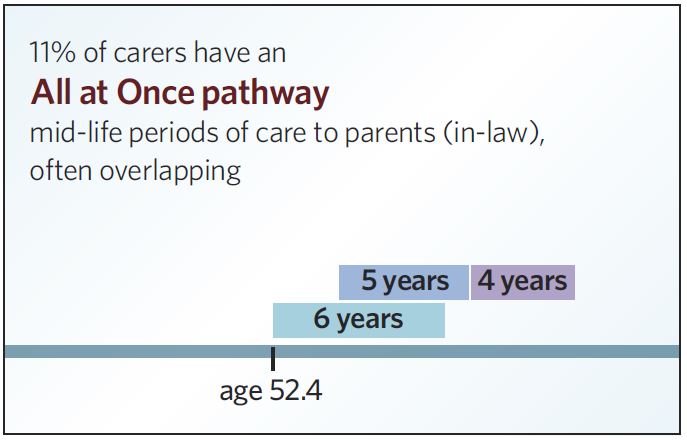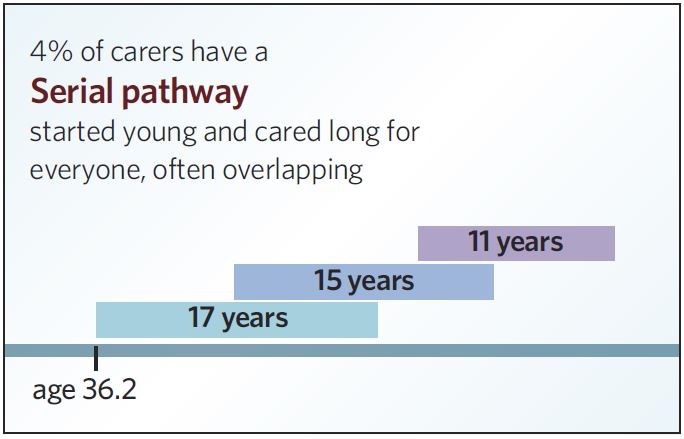
June 25, 2019
Research Recap: Beyond “Snapshots” to “Lifetimes” of Family Care
Janet Fast, Norah Keating, Jacquie Eales, Choong Kim and Yeonjung Lee
According to the most recent General Social Survey (GSS) on Caregiving and Care Receiving, 28% of Canadians provided care to a family member or friend in the previous year.1 But “snapshots” in time such as this don’t paint a complete picture of caregiving experiences. Looking across the life course provides more insight into how Canadians are engaged in care across their lives and reveals a number of lifetime “pathways” of care that are commonly experienced.2 In fact, half (46%) of all Canadians have provided care at some time in their lives, showing that family care is a much more common experience than many people had imagined. It’s time to move beyond snapshots to focus on lifetimes of family care.
Groundbreaking research at the University of Alberta, using data from Statistics Canada’s 2012 GSS shows, for the first time, five distinct care trajectories (pathways) across the life courses of 3,299 adults aged 65 and older: Late Bloomer, Encore, All at Once, Enduring and Serial. This innovative perspective shows not only how care evolves across the life course but that it evolves in diverse ways for different individuals. We now can examine the cumulative lifetime impact of caregiving to identify carers at greatest risk of poor health, social isolation and poverty in later life to better target policy interventions.
A life course approach highlights diverse patterns of caregiving across carers’ lives
Research shows that 1 in 2 Canadians aged 65 and over – or more than 2 million people – have cared for others one or more times across their lives.
CARE TRAJECTORIES
Late Bloomer
One in 2 carers (54%) follow a Late Bloomer pathway. Its defining feature is a single, short episode of providing care (fewer than 5 years), mostly to spouses or parents. This pathway starts in the early 60s (average 63 years); 43% of Late Bloomer carers are men and 57% are women.

Encore
One in 4 carers (25%) follow an Encore pathway. Its defining feature is a first long episode of providing care, mostly to parents or spouses, followed by shorter episodes increasingly to same-generation friends or neighbours. This pathway starts in the early 50s (average 52 years) and lasts nearly 14 years; 41% of Encore carers are men and 59% are women.

All at Once
One in 10 carers (11%) follow an All at Once pathway. Its defining feature is a decade or more of providing care, mainly to parents or parents-in-law, and usually for more than one parent at the same time. This pathway starts in the early 50s (average 52 years); 36% of All at Once carers are men and 64% are women.

Enduring
One in 16 carers (6%) follow an Enduring pathway. Its defining feature is a first very long episode of providing care to close family, followed by a second long episode of providing care to close family or friends. Care to children or siblings with chronic health conditions/disabilities was notable. This pathway starts in the early 30s (average 34 years) and has the longest duration (average 33 years); 37% of Enduring carers are men and 63% are women.

Serial
One in 25 carers (4%) follow a Serial pathway. Its defining feature is a long-term pattern of caring for others (close relatives, distant relatives, friends or neighbours), often at the same time. This pathway starts in the mid-30s (average 36 years) and spans more than three decades (31 years on average). Of all care pathways, the Serial pathway has the largest proportion of women carers (71%).

Read the full “Life Course Trajectories of Family Care” open access study through Intenga Connect.
Authors
Janet Fast, PhD, is a Family Economist and Professor, Department of Human Ecology, University of Alberta.
Norah Keating, PhD, is a Family Gerontologist and Director, Global Social Issues on Aging (International Association of Gerontology and Geriatrics).
Jacquie Eales, MSc, is a Communication and Knowledge Translation specialist and Research Manager, Department of Human Ecology, University of Alberta.
Choong Kim is an Applied Economist and PhD candidate, Department of Human Ecology, University of Alberta.
Yeonjung Lee, PhD, is a specialist in Comparative Welfare States and Gerontology and Assistant Professor, Faculty of Social Work, University of Calgary.
Notes
- Maire Sinha, “Portrait of Caregivers, 2012,” Spotlight on Canadians: Results from the General Social Survey, Statistics Canada catalogue no. 89-652-X (September 2013). Link: http://bit.ly/1jxgAAm.
- Joohong Min, Yeonjung Lee, Janet Fast, Jacquie Eales and Norah Keating, “Life Course Trajectories of Family Care,” Innovation in Aging, 2:1 (November 2018). Link: https://bit.ly/2MwiXf8.
Stay in the know
InfoVanier
A monthly newsletter of research, resources, and events
Linktree
Get alerts on new Vanier Institute publications, events, and announcements
